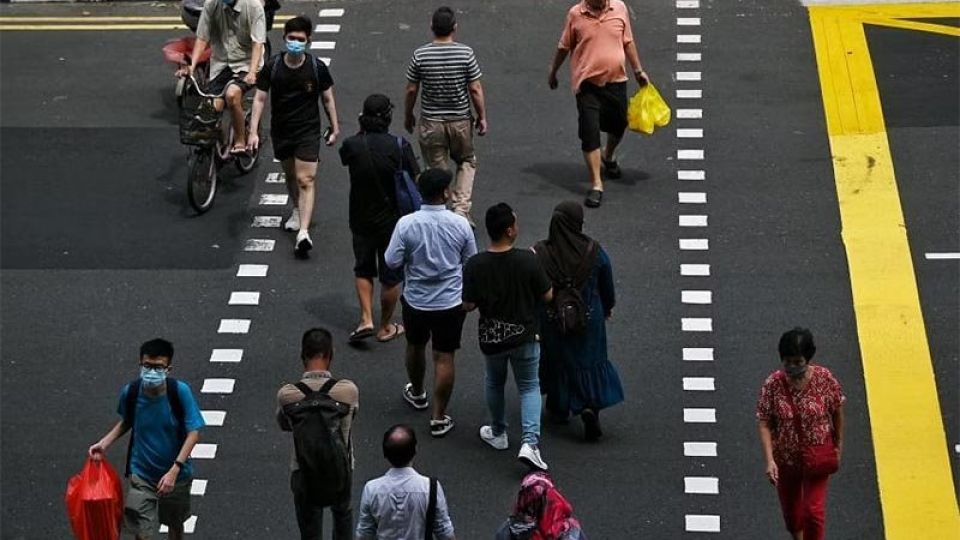September 14, 2023
BANGKOK – Being part of a country’s majority ethnicity and religion is closely associated with national belonging, a new survey of six Asian states has found. Singapore, however, stood out as the exception.
And when it comes to mixing religion and politics, views were mixed in the study released by the Pew Research Centre on Tuesday. The study involved more than 13,000 people across Cambodia, Sri Lanka, Thailand, Singapore, Malaysia and Indonesia, and was conducted from June to September 2022.
In Malaysia, 67 per cent of respondents and 79 per cent of Muslim respondents felt it was very important to be Muslim to be a true Malaysian. In Indonesia, 81 per cent of respondents linked being Muslim to being truly Indonesian. Among Thai respondents, 73 per cent believed being Buddhist was very important to be truly Thai.
But in Singapore, where there is no majority religion, just 13 per cent said being Buddhist was key to being truly Singaporean. Buddhists make up 31 per cent of the population.
A similar trend was observed for ethnicity and national belonging. In Thailand, 80 per cent of respondents said being part of the majority ethnic group was very important to being a true Thai. In Malaysia, it was 69 per cent and in Indonesia, 75 per cent. But only 19 per cent of Singaporeans felt this way.
The Pew survey also asked Buddhists if they supported basing their national laws on the Buddhist dharma, and Muslims if they were in favour of using syariah. The survey did not define what a dharma-based or syariah-based legal code would entail.
In Buddhist-majority countries, this notion had traction – 96 per cent of Buddhists in Cambodia backed the idea, 80 per cent in Sri Lanka and 56 per cent in Thailand.
The idea also found favour in Muslim-majority countries. In Malaysia, 86 per cent of Muslims supported making syariah the law of the land. In Indonesia, the figure was 64 per cent.
But even in Muslim-minority countries, support for syariah was widespread among believers.
A majority of Muslims in Sri Lanka (71 per cent), Thailand (67 per cent) and Singapore (63 per cent) supported syariah being the official law of the land in areas where Muslims are a majority.
Muslims in these countries already have access to Islamic law in certain circumstances. In Singapore, for example, the Syariah Court can hear and decide on matters related to divorce and inheritance. In the southern border provinces of Thailand, Muslims can use Islamic law in family disputes.
Meanwhile, 39 per cent of Singapore Buddhists surveyed backed having the dharma as the basis for the law.
Commenting on the survey findings, Mr Vichak Panich, director of Bangkok’s Vajrasiddha Institute of Contemplative Learning, said that while Buddhist nationalism was concerning, the fact that Buddhism is embedded in Thailand’s power structure also meant that it was hard for Buddhists to be critical about it.
Singaporeans, in contrast to the other nationalities surveyed, were not as religious, with 22 per cent of respondents not identifying with any religion.
While the majority in other countries said religion was very important in their lives, including 98 per cent in Indonesia, only 36 per cent in Singapore felt that way.
Proselytisation was seen as unacceptable by respondents from all religious groups, except by Christian respondents from Singapore. Around 59 per cent of those surveyed said it was acceptable.
Meanwhile, Muslims in Malaysia and Indonesia commonly described Islam as a culture, family tradition or ethnicity, rather than simply a religion that one chose to follow. Three-quarters of Malaysian Muslims, for example, described Islam as “an ethnicity one is born into”.
Dr Norshahril Saat, a senior fellow at the ISEAS – Yusof Ishak Institute, called the survey “a good start” to understanding “the macro view” of people.
“It’s not really something to be worried about because we are looking at Islam on the one hand versus orientations or denominations on the other. It’s not so much about them identifying themselves as Muslim but it’s what kind of Islam,” he told The Straits Times.
“Are they moderates, are they conservative or are they exclusivist? Are they pushing for a more liberal or tolerant kind of Islam? Or are they basically wanting to establish syariah laws in the more conservative sense?”
He also pointed out that people who back syariah may be supporting specific laws or the values of syariah.
Muslims in Indonesia and Malaysia who were surveyed were more favourable of religious leaders engaging in politics than Buddhists surveyed in Buddhist-majority countries. For instance, 58 per cent of Muslims in Indonesia and 69 per cent of Muslims in Malaysia believe religious leaders should talk publicly about the politicians and political parties they support. In Thailand, Cambodia and Sri Lanka, fewer than half of Buddhists felt that such religious involvement in politics was acceptable.
In Singapore, the idea of mixing politics and religion was generally rejected. Only 26 per cent of Buddhists, 41 per cent of Muslims, 26 per cent of Christians and 37 per cent of Hindus supported their religious leaders talking about the parties or politicians they backed.
Buddhists and Muslims were also most likely to see extremists from their faith as a threat to their religion. In Indonesia and Singapore, for instance, 54 per cent of Muslims felt that Muslim extremists were a threat to Islam in their countries. The figure was higher than for other potential threats, including the influence of the United States or China, the growing number of Christians or Buddhists and tourists.


